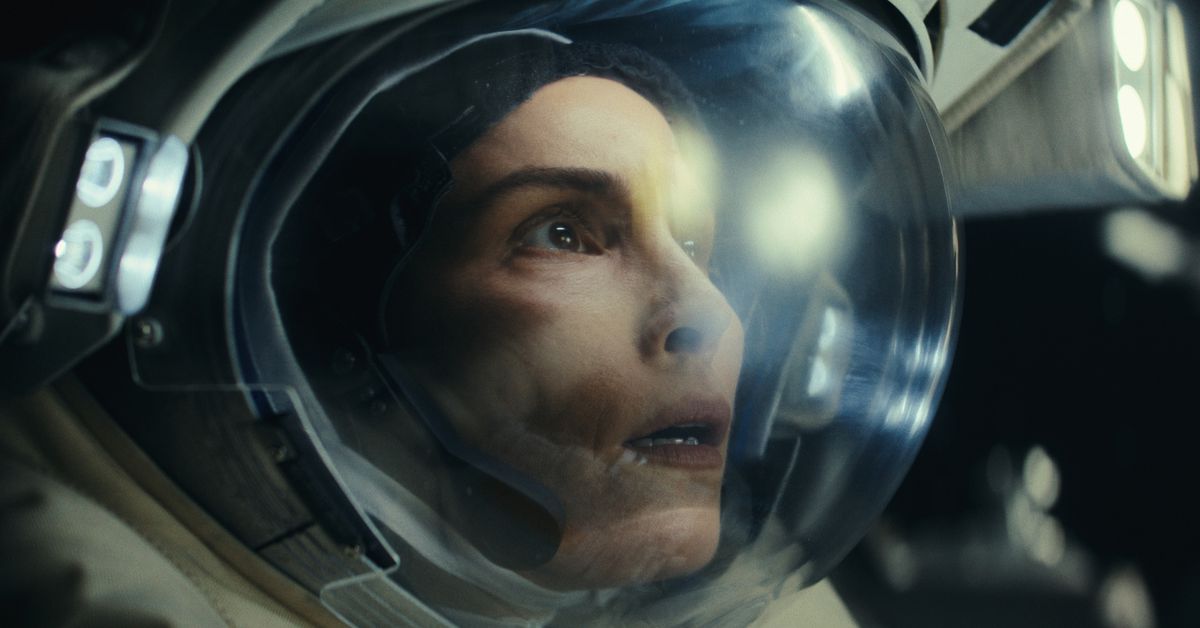
Slowly but surely, Apple TV Plus has morphed itself into arguably the premier destination for streaming science fiction. (Or at least streaming sci-fi not named Star Wars or Star Trek.) There are adaptations like Silo and Foundation; original stories like Invasion, For All Mankind, and Severance; and even a franchise spinoff with Monarch: Legacy of Monsters. There’s a nice range to the service’s offerings — and now it’s adding another flavor with the premiere of Constellation. In its first few episodes the show is dark, creepy, and will mess with your mind in a way that makes it just the thing for those already missing True Detective: Night Country.
The first three episodes of Constellation premiere on February 21st, and they follow an astronaut named Jo (Noomi Rapace), who is part of a small crew working on the International Space Station. Also on board is a mysterious and experimental device from NASA — and the second it’s switched on for tests, all hell breaks loose. Something smashes into the ISS, and when Jo heads outside to do repairs, she swears she sees the body of an old cosmonaut. Eventually, the rest of the crew aboard the ISS are forced to evacuate due to the damage, while Jo stays behind to repair an escape pod and hopefully get back to Earth, too.
Jo does eventually make it back safely, which, yes, is a small spoiler, but also key to the structure of the show, as the story jumps around between her time on the ISS and her life after she returns to Earth. (And even though you know she survives, those moments are still incredibly stressful.) It’s a story jam-packed with mysteries, the core of which is just what the heck that NASA gadget even is. The project is led by a legendary American astronaut named Henry (Jonathan Banks), who won a Nobel prize decades ago, but now does guest appearances at sci-fi cons and is desperate to return to the forefront of scientific discovery. Early on, all we really know about his research is that it involves finding another state of matter, one that is apparently only possible in a zero-gravity environment, and Henry is so determined to unravel this mystery that he cares more about the results of the test than any of the human lives it ends up costing.
Whatever it is, the experiment has some very noticeable side effects, particularly on Jo. Initially everything seems fine after her improbable return to Earth; she immediately reunites with her husband and daughter and tries to get back to something resembling a normal life. But it eventually becomes clear that things aren’t normal.
First, it’s small details; Jo forgets what color the family car is and mixes up a friend’s name. It gets weirder — and darker — from there. When Jo is giving a statement on what happened during the ISS disaster, her memory differs from the rest of the crew. Jo’s visions hint at a strange disconnect between her current self and who she was before, and Rapace’s performance almost makes it feel like you’re watching two different characters at times. At certain points, Constellation approaches psychological horror, with unsettling voices, blood and severed body parts floating around in zero-G, and constant time jumps that make it hard to tell what’s real and what is one of Jo’s hallucinations (if they are in fact hallucinations). Which, of course, is exactly how she feels.
I brought up Night Country earlier because the shows share a similar vibe (and not just because they both feature important scenes where someone goes searching in a snowstorm in the dark). They’re slow burns, taking time to share important clues and information, and occasionally obscuring them under bits of weirdness or horror. Of course, it’s impossible to tell yet if Constellation actually makes good on all of its creepy promises, and there are plenty of examples of shows that get, let’s say, lost, during that process. But it’s off to a good start — and gives another reason for sci-fi fans to check out Apple’s streaming service.
Constellation premieres on Apple TV Plus on February 21st, with new episodes out on Wednesdays.
https://www.theverge.com/24065198/constellation-review-apple-tv-plus

